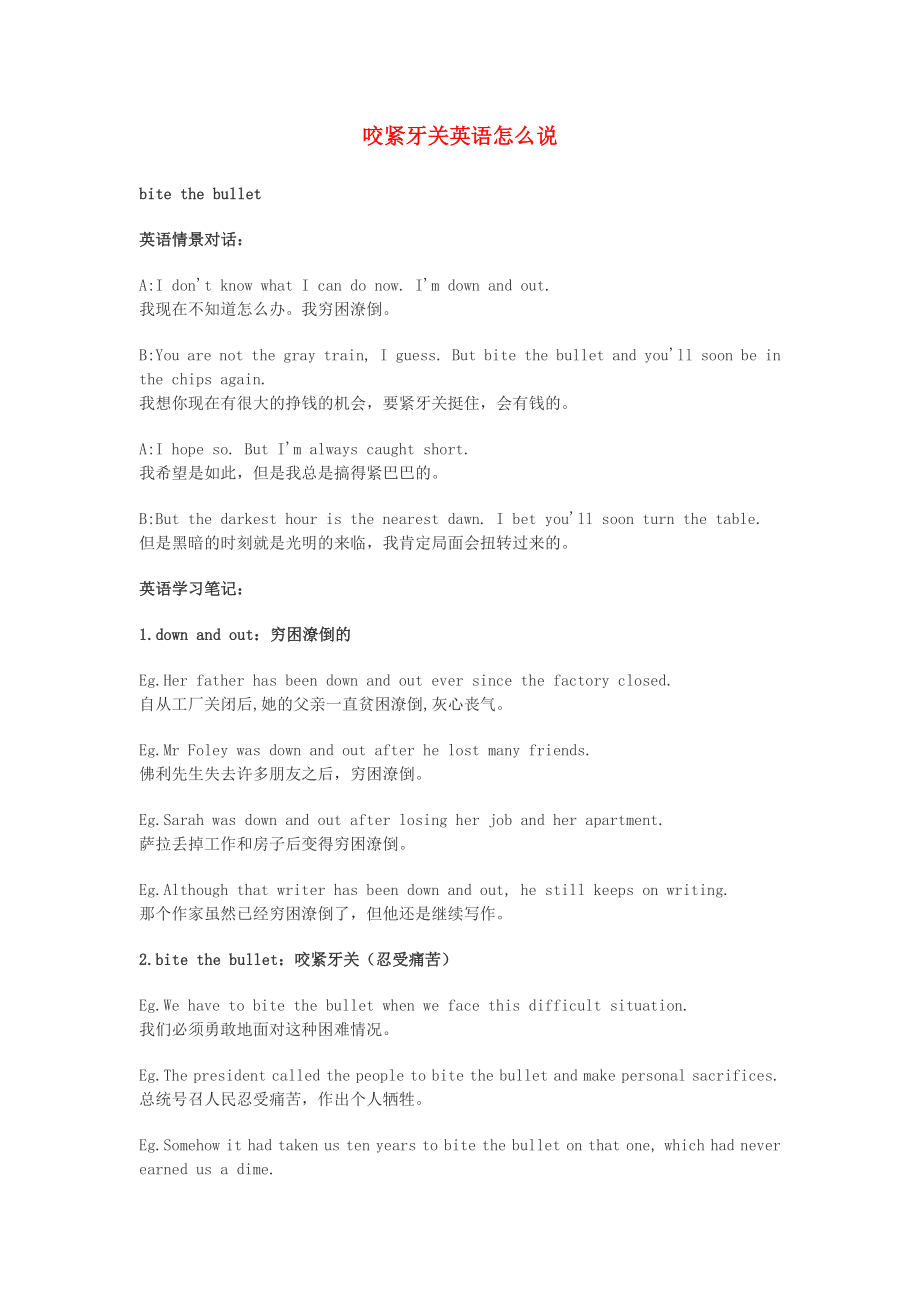《2015年高中英語(yǔ)俚語(yǔ)習(xí)語(yǔ)小對(duì)話 第60期 咬緊牙關(guān)英語(yǔ)怎么說(shuō)素材》由會(huì)員分享����,可在線閱讀�,更多相關(guān)《2015年高中英語(yǔ)俚語(yǔ)習(xí)語(yǔ)小對(duì)話 第60期 咬緊牙關(guān)英語(yǔ)怎么說(shuō)素材(3頁(yè)珍藏版)》請(qǐng)?jiān)谘b配圖網(wǎng)上搜索�。
1、咬緊牙關(guān)英語(yǔ)怎么說(shuō)
bite the bullet
英語(yǔ)情景對(duì)話:
A:I don't know what I can do now. I'm down and out.
我現(xiàn)在不知道怎么辦。我窮困潦倒����。
B:You are not the gray train, I guess. But bite the bullet and you'll soon be in the chips again.
我想你現(xiàn)在有很大的掙錢的機(jī)會(huì)�,要緊牙關(guān)挺住�,會(huì)有錢的�����。
A:I hope so. But I'm always caught short.
我希望是如此��,但是我總是搞得緊巴巴的��。
2�、B:But the darkest hour is the nearest dawn. I bet you'll soon turn the table.
但是黑暗的時(shí)刻就是光明的來(lái)臨����,我肯定局面會(huì)扭轉(zhuǎn)過(guò)來(lái)的。
英語(yǔ)學(xué)習(xí)筆記:
1.down and out:窮困潦倒的
Eg.Her father has been down and out ever since the factory closed.
自從工廠關(guān)閉后,她的父親一直貧困潦倒,灰心喪氣。
Eg.Mr Foley was down and out after he lost many friends.
佛利先生失去許多朋
3、友之后��,窮困潦倒。
Eg.Sarah was down and out after losing her job and her apartment.
薩拉丟掉工作和房子后變得窮困潦倒。
Eg.Although that writer has been down and out, he still keeps on writing.
那個(gè)作家雖然已經(jīng)窮困潦倒了�����,但他還是繼續(xù)寫(xiě)作��。
2.bite the bullet:咬緊牙關(guān)(忍受痛苦)
Eg.We have to bite the bullet when we face this difficult situation.
我們必
4���、須勇敢地面對(duì)這種困難情況�。
Eg.The president called the people to bite the bullet and make personal sacrifices.
總統(tǒng)號(hào)召人民忍受痛苦�����,作出個(gè)人犧牲�。
Eg.Somehow it had taken us ten years to bite the bullet on that one, which had never earned us a dime.
對(duì)這一樁從未給我們掙一分錢的買賣�����,我們苦苦容忍了十年�。
Eg.Taking everything into consideration�����,I decid
5�、ed to bite the bullet and accept the tough job.
對(duì)所有因素作了全面考慮之后�����,我決定咬緊牙關(guān)���,接受這份棘手的工作。
3.in the chips:有錢,富裕����,富有
Eg.Within a short time I will be in the chips again.
用不了多久我又會(huì)有一大筆錢的。
Eg.He is in the chips——so much money so that he can buy anything he wants.
他有錢——如此有錢����。所以他可以買任何他要的東西�����。
Eg.I want to get ma
6���、rried; preferably to a man who is in the chips.
我想結(jié)婚,最好是找到一位有錢人��。
Eg.That handsome fellow is in the chips and many hopeful girlfriends.
那個(gè)英俊的家伙是一個(gè)又有錢又有許多想成為他女友的人�����。
4.turn the table:轉(zhuǎn)變局勢(shì),扭轉(zhuǎn)局勢(shì)��,轉(zhuǎn)敗為勝
Eg.He says his friend is confident in turning the table.
他說(shuō)他的朋友很有信心扭轉(zhuǎn)局面。
Eg.The tables are turned.
7、
局面扭轉(zhuǎn)過(guò)來(lái)了����。
Eg.On such occasions, small gestures can turn the table.
這種時(shí)候�����,小小的一個(gè)手勢(shì)能大大地扭轉(zhuǎn)局面�����。
Eg.He never knew when everything was lost, and if it was, he would turn the table.
對(duì)他來(lái)說(shuō)���,毫無(wú)指望的情況是沒(méi)有的,即使遇到那種情況����,他也要扭轉(zhuǎn)局面。
5.be caught/taken short:短缺�,缺乏
Eg.Joe was caught short of clothes when he had to go in a
8�����、 trip.
喬要去旅行時(shí),衣服不夠穿了����。
Eg.Mrs Hobbs was caught short when the newspaper boy came for his money a day early.
報(bào)童提早一天來(lái)收?qǐng)?bào)費(fèi)����,霍布斯太太的錢不夠交付。
Eg.There is some meat in the freezer and we are not caught short.
電冰箱里有肉,我們就不會(huì)急需時(shí)作難了��。
Eg.Will it be all right if I pay you next week? I'm rather caught short.
我下星期付錢給你行嗎? 我手頭缺錢�。
名言警句:
The darkest hour is the nearest dawn.
黑暗的時(shí)刻就是光明的來(lái)臨�。
 2015年高中英語(yǔ)俚語(yǔ)習(xí)語(yǔ)小對(duì)話 第60期 咬緊牙關(guān)英語(yǔ)怎么說(shuō)素材
2015年高中英語(yǔ)俚語(yǔ)習(xí)語(yǔ)小對(duì)話 第60期 咬緊牙關(guān)英語(yǔ)怎么說(shuō)素材

